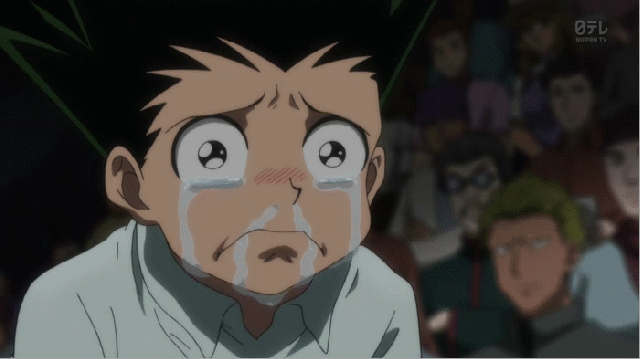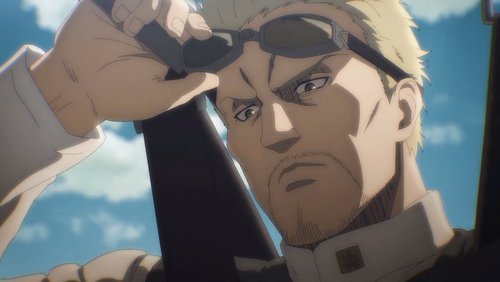Why Hunter X Hunter (2011) Just Isn't That Great.
/HunterxHunter: the 2011 remake. It’s a series beloved by millions of fans, whose popularity and renown are second only to those of the ‘Big Three’ shonen. It’s got a 9/10 rating on both IMDB and MyAnimeList based on hundreds of thousands of reviews—and so when I finally got around to watching it a couple years ago, I was expecting an indisputable masterpiece…
Hunter x Hunter’s main character, Gon, crying
But that’s not what I got. Don’t get me wrong; HunterxHunter (or HxH) has many great elements working for it. It features a colorful cast of compelling characters with fascinating relationships (i.e Meruem and Komugi), an exciting world, solid animation, and a unique take on the tried-and-true “chakra/life force” based superpower system with ‘Nen’. I think HunterxHunter is good, just not that good, due to some clear weaknesses:
*Please note that these critiques are, of course, my own opinion, based solely on the 2011 anime. It may be that information in the manga or the original 1999 series invalidates or addresses my grievances, but my experience with the series lies exclusively with the 2011 anime adaptation.*
My critiques lie with the fact that I found many arcs’ conclusions unsatisfying, the system of Nen and its governing mechanics became far too convoluted and ill-defined, and the narrator was a constant distraction and flagrant breaker of the golden rule, ‘show don’t tell.’
Let’s delve into things.
Throughout HxH’s exciting storylines, I would say the only arcs whose conclusions actually felt satisfying were Greed Island’s and Yorknew’s. In the former, our protagonists, Gon and Killua, after some intense training and hard work, manage to prevail over “The Bomber,” collect every card, and emerge victorious from the deep-dive virtual survival game. No stone was left unturned, no enemy unconquered, and our main characters evolved significantly—great. Yorknew was much the same way: the Phantom Troupe is a colourful cast of antagonists that gave Gon and Killua a poignant wake-up call, whose friend Kurapika was able to take a pretty big first step towards exacting his revenge on the ‘Spiders,’ giving them their just desserts, and reclaiming his kins’ scarlet eyes. Wonderful. Now, let’s look at some of the other arcs.
An image of ‘Heaven’s Arena’
In the Heaven’s Arena arc, Gon and Killua train by way of battling their way up the plot’s titular colosseum. At first, it’s a cake-walk—the boys are much more powerful than everyone, and they wipe the floor with every opponent they get matched against... until at long last, they reach the upper echelons of the tower, floor 200—and enter a whole new league of competition, in which the boys find themselves entirely outclassed—most of all by the renowned ‘Floor Masters.’ They meet Wing, and after learning about Nen while training under him for a few days, they reach a point where they can finally at least be competitive in the arena: so, they (barely) win a few fights, Gon battles Hisoka and loses, and then they just…leave? ‘We got what we came for,’ that’s that, and they spend ~ over a week playing around on the Island Gon grew up on before heading to Yorknew…
Killua and Gon awakening Nen With Wing’s Help
What about the floor bosses? We didn’t even get to catch a glimpse of them. And what about all the other techniques they could’ve learned from Wing? They’d grown so much stronger in just a couple weeks under his tutelage—it was obvious they’d barely started to scratch the surface! Maybe I’ve just been primed by the protagonists of so many other shonens over the years—like Goku or Naruto, for instance—for whom gaining strength is the prime, omnipresent motivation, that seeing Gon and Killua satisfied with their growth despite having a clear picture of just how far they had left to go was jarring and unsatisfying to me. All I know is if I were in the world of HxH, I wouldn’t be taking a week off to play around after learning to tap into an intrinsic power that allows me to perform superhuman feats.
And then there’s the Chimera Ant arc. First, I have to say that I was really put off by the constant narratorial interjections, which exacerbates the pace already made tedious by the insane amount of flashbacks, rewinds, and freeze frames that drag literal seconds of in-universe time into taking up entire twenty-minute episodes. Truth be told, I wasn’t a huge fan of HxH’s narrator from the beginning: he seemed to have a flagrant disregard for the golden rule of ‘show don’t tell,’ which visual media like anime ought to capitalize on as much as possible—and particularly in this arc, I found his constant narration of what I can clearly see happening on screen distracted from the tension more than it accentuated the tension. But, I digress.
Gon and Killua, honing the fundamentals of Nen
Another reason why the Chimera Ant arc is so unsatisfying is due to how convoluted the mechanics of Nen became. I know that earlier in this blog, I praised HxH’s take on the ‘life energy’ system, and that’s because, up until this arc, I was very impressed by it. The three ways by which Nen could be channeled (Ten, Ren, Zetsu), which served as the foundation for many more advanced techniques and combinations, alongside the six classes of Nen users, and additional rules in place (like the ability for Nen to persist after its user's death, or that explaining how one’s ability works to an opponent would make it more powerful), felt like a very competent and thoughtful system, complex enough in its own right. It seemed to have clear parameters, rules, and limitations, that could be played with and pushed in clever, interesting ways.
Hisoka Wielding his ‘Bungee Gum’ in a unique way
But then we delved into ‘Hatsu’--the personal, unique expression of one’s Nen—and all the mechanics of Nen effectively went out the window. From the viewer’s perspective, fights went from tactical bouts between enemies taking advantage of their strengths, minimizing their weaknesses, and utilizing their at-first-glance simple and unimpressive abilities to their fullest potential in order to outsmart and catch opponents off guard, to unsolvable puzzles that can’t be understood by the viewer until the narrator butts in to explain the indecipherable mechanics at play. From the beginning of the show, watching Hisoka use his ‘Bungee Gum’ in tandem with ‘Texture Surprise’, for example, is always rewarding to watch—by understanding the mechanics of Nen, it’s possible to grasp, on some level, how they’re being applied with these abilities, and the viewer can appreciate Hisoka’s creativity without needing the narrator to interject with an explanation. WIth ‘Hatsu,’ however, anything is possible with Nen: the sky’s the limit, and downright bizarre powers start showing up that seem more a joke or play on the characters’ personalities—like Cheetu’s “Tag,” or Knuckle’s, a stereotypical thug/delinquent-type character, debt-collecting “Hakoware: bankruptcy, chapter seven”--than a thoughtful adherence to any of the previously established mechanics, and in fact breaks them. And that’s frustrating, because a system I’d felt I’d understood was now largely incomprehensible and unpredictable (in a bad way) with poorly defined, or dare I say, nonexistent limitations that you’re forced to wait for the narrator to come along and ‘explain’ for every individual character’s unique ability.
An image of Knuckle’s strange ‘Hakoware’ Ability
Seriously, if you need a refresher, I dare you to look up Knuckle’s “Hakoware,” read its mechanics, and tell me it isn’t just the most convoluted, random ability ever conceived: as a further challenge, try and explain in what precise ways Nen is being applied to bring about the ability’s manifestation and effects, aside from that it falls under the category of ‘conjuration.’ Not even the official wiki explaining the ability can! Even with careful, retrospective analysis, it’s unclear how many of the Nen abilities featured in the Chimera Ant arc (and onwards, I presume) actually function, or what their potential limits are. This, coupled with the fact that Gon and Killua took backseat positions to many other characters, and a villain as layered as Meruem was done in lamely by poison, made this a generally disappointing arc. And don’t even get me started on Gon’s anticlimactic reunion with Gin that took place shortly after.
So, those are the reasons why I think Hunter x Hunter, the 2011 anime, is decent, but a far cry from the masterpiece it often gets credited for being. What are your thoughts? Do you agree? Disagree? Am I an idiot who just got lost in the show’s sophistication? Feel free to let me know, and until next time, cultured ones!
Yo, fellow geeks! My name’s Garrett Johnson; I’ve been a geek for pretty much my whole life, playing video games, reading comics, watching anime—and I’ve developed a bit of a passion for critically analyzing it all! So you can trust that my opinions are both informed and reliable.
A bit more about me: I love to write, and my dream is to one day be a best-selling author, writing fantasy comics or books. I also like to sing karaoke, do fun voice impressions (to varying degrees of success), and occasionally come up with some “philosophical” one-liners (example below).
“To make no enemies is to make an enemy of yourself.”










